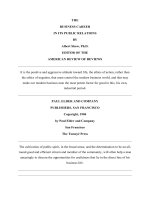The Project Gutenberg EBook of The business career in its public relations, by Albert Shaw ppt
Bạn đang xem bản rút gọn của tài liệu. Xem và tải ngay bản đầy đủ của tài liệu tại đây (356.74 KB, 127 trang )
The Project Gutenberg EBook of The
business career in its public relations,
by
Albert Shaw
This eBook is for the use of anyone
anywhere at no cost and with
almost no restrictions whatsoever. You may
copy it, give it away or
re-use it under the terms of the Project
Gutenberg License included
with this eBook or online at
www.gutenberg.net
Title: The business career in its public
relations
Author: Albert Shaw
Release Date: August 9, 2009 [EBook
#29641]
Language: English
*** START OF THIS PROJECT GUTENBERG EBOOK
BUSINESS CAREER PUBLIC RELATIONS ***
Produced by The Online Distributed
Proofreading Team at
(This file was
produced from images
generously made available by The Internet
Archive/Canadian
Libraries)THE BUSINESS CAREER
Barbara Weinstock
Lectures on
The Morals of Trade
This series will contain
essays by representative
scholars and men of
affairs dealing with the
various phases of the
moral law in its bearing
on business life under
the new economic
order, first delivered at
the University of
California on the
Weinstock foundation.
The first volume to
appear in this series is:
The Business Career. By
Albert Shaw, Ph.D.
Paul Elder and Company
San Francisco
THE
B U S I N E S S
C A R E E R
IN ITS PUBLIC
RELATIONS
BY
ALBERT SHAW, PH.D.
EDITOR OF THE
AMERICAN REVIEW OF REVIEWS
It is the
positive and
aggressive
attitude
toward life,
the ethics of
action, rather
than the ethics
of negation,
that must
control the
modern
business
world, and
that may make
our modern
business man
the most
potent factor
for good in
this, his own,
industrial
period.
T
PAUL ELDER AND COMPANY
PUBLISHERS, SAN FRANCISCO
Copyright, 1904
by Paul Elder and Company
San Francisco
The Tomoyé Press
HE
cultivation of
public spirit,
in the broad
sense, and the
determination
to be an all-
round good
and efficient
citizen and
member of the
community,
will often help
a man
amazingly to
discern the
opportunities
for usefulness
that lie in the
direct line of
his business
D
life.
THE FOUNDER'S
PREFACE
ESPITE all that can still be said
against trade practices, against the
business lies that are told, the false
weights and measures that are used, the
trade frauds to which the public is
subjected, we are nearer a high
commercial standard than ever before in
the world's history.
Man's confidence in man is greater than
ever before, the commercial loss through
fraud and dishonesty is constantly
diminishing and standards are slowly but
surely moving upward. The honest man's
chances for success in business are better
than ever before, and the dishonest man's
chances for lasting commercial success
are less than ever before. To grow rich by
failing in business is no longer regarded
as an act of cleverness. The professional
bankrupt finds it more and more difficult
to get credit. He soon discovers that even
his cash will not win for him the attention
that his poorer neighbor commands simply
by his character.
Education has done splendid service in
raising commercial standards. As a rule,
the high-toned business man is
enlightened, and, as a rule, the dishonest,
unscrupulous man in business is ignorant.
Great aid in the direction of raising
commercial standards may be rendered by
the further spreading of knowledge and
enlightenment. There are still many
misguided men in business who imagine
that there can be no success without false
weights and measures, without lies and
deceit. It is the duty of every man in
business, who loves the work in which he
is engaged, to do whatever he can to
correct this mistaken notion, and to arouse
the same sense of honor in the circles of
commerce that, as a rule, is found in
professional life.
In the decades to come men will take as
much pride in being engaged in trade as
men always have taken in being members
of a liberal profession.
It seemed to me that a step toward
hastening such a day might be taken by
inviting the best thoughts of some of the
country's best minds on the subject of "The
Morals of Trade."
What better platform for the expression of
such ideas than that furnished by the
College of Commerce of the University of
California? What better way to spread
such thoughts than by means of their
distribution in printed form? What better
way to train to higher commercial
standards the minds, not only of the youths
who are seeking a university education
and who have in view a business career,
but also of the many already engaged in
business who have not had the benefit of a
college training?
It seemed to me that such a step might set
in motion a commercially educational
force which would prove far-reaching in
its influence and most helpful in raising
business character.
Thoughts such as these prompted the
recent establishing of the lectureship on
"The Morals of Trade" in connection with
the College of Commerce of the
University of California.
Let the hope be expressed that this is but
the beginning of a movement which may
be taken up by abler and wealthier men in
business and broadened in many ways. A
growing literature on "The Morals of
Trade," representing the best thoughts of
our best minds, is likely to live and to do
splendid service in elevating commerce
and in raising its standards.
H.
Weinstock.
T
HE purpose of this discourse is to set
forth some of the social and public
aspects of trade and commerce in our
modern life. We have heard much in these
recent times concerning the State in its
relation to trade, industry, and the
economic concerns of individuals and
groups. Rapidly changing conditions,
however, make it fitting that more should
be said from the opposite standpoint;—
that is to say, regarding the
responsibilities of the business community
as such toward the State in particular and
toward the whole social organism in
general.
Some of the thoughts to which I should
like to give expression might perhaps too
readily fall into abstract or philosophical
terms. They might, on the other hand, only
too readily clothe themselves in cant
phrases and assume the hortatory tone. I
shall try to avoid dialectic or theory on the
one hand, and preaching on the other. I
take it that what I am to say is addressed
chiefly to young men, and that it ought to
serve a practical object.
In the universities the spirit of idealism
dominates. The academic point of view is
not merely an intellectual one, but it is
also ethical and altruistic. In the business
world, on the other hand, we are told that
no success is possible except that which is
based upon the motive of money-getting by
any means, however ruthless. We are told
that the standards of business life are in
conflict irreconcilable with true idealistic
aims. It is this situation that I wish to
analyze and discuss; for it concerns the
student in a very direct way.
Our moralists point out the dangerous
prevalence of those low standards of
personal life and conduct summed up in
the term "commercialism." We are warned
by some of our foremost teachers and
ethical leaders against commercialism in
politics and commercialism in society. So
bitterly reprobated indeed is the influence
of commercialism that it might be inferred
that commerce itself is at best a necessary
evil and a thing to be apologized for. But
if we are to accept this point of view
without careful discrimination, we may
well be alarmed; for we live in a world
given over as never before to the whirl of
industry and the rush and excitement of the
market-place.
This, of all ages, is the age of the business
man. The heroic times when warfare was
the chief concern of nations, have long
since passed by. So too the ages of faith,
—when theology was the mainspring of
action, when whole peoples went on long
crusades, and when building cathedrals
and burning heretics were typical of men's
efforts and convictions—have fallen far
into the historic background. Further, we
would seem in the main to have left
behind us that period of which the French
Revolution is the most conspicuous
landmark, when the gaining of political
liberty for the individual seemed the one
supreme good, and the object for which
nations and communities were ready to
sacrifice all else.
Through these and other periods
characterized by their own especial aims
and ideals, we have come to an age when
commercialism is the all-absorbing thing;
and we are told by pessimists that these
dominant conditions are hopelessly
incompatible with academic idealism or
with the maintenance of high ethical
standards, whether for the guidance of the
individual himself or for the acceptance
and control of the community. It is
precisely this state of affairs, then, that I
desire briefly to consider. And I shall
keep in mind those bearings of it that
might seem to have some relation to the
views and aims of students who are soon
to go out from the sheltered life of the
university,—under the necessity, whether
they shrink from it or not, of becoming
part and parcel of this organism of
business and trade that has invaded almost
every sphere of modern activity.
I have only recently heard a great and
eloquent teacher of morals, himself an
exponent of the highest and finest culture
to which we have attained, speak in terms
of the utmost doubt and anxiety regarding
the drift of the times. To his mind, the
evils and dangers accompanying the
stupendous developments of our day are
such as to set what he called
commercialism in direct antagonism to all
that in his mind represented the higher
good, which he termed idealism. The
impression that he left upon his audience
was that the forces of our present-day
business life are inherently opposed to the
achievement of the best results in
statecraft and in the general life of the
community. He could propose no remedy
for the evils he deplored except education,
and the saving of the old ideals through the
remnant of the faithful who had not bowed
the knee in the temple of Mammon. But he
pointed out no way by which to protect the
tender blossoms of academic idealism,
when they meet their inevitable exposure
in due time to the blighting and withering
blasts of the commercialism that to him
seemed so little reconcilable with the
good, the true, and the beautiful.
To all this the practical man can only
reply, that if, indeed, commercialism itself
cannot be made to furnish a soil and an
atmosphere in which idealism can grow,
bud, blossom, and bear glorious fruit,—
then idealism is hopelessly a lost cause. If
it be not possible to promote things
ideally good through these very forces of
commercial and industrial life, then the









